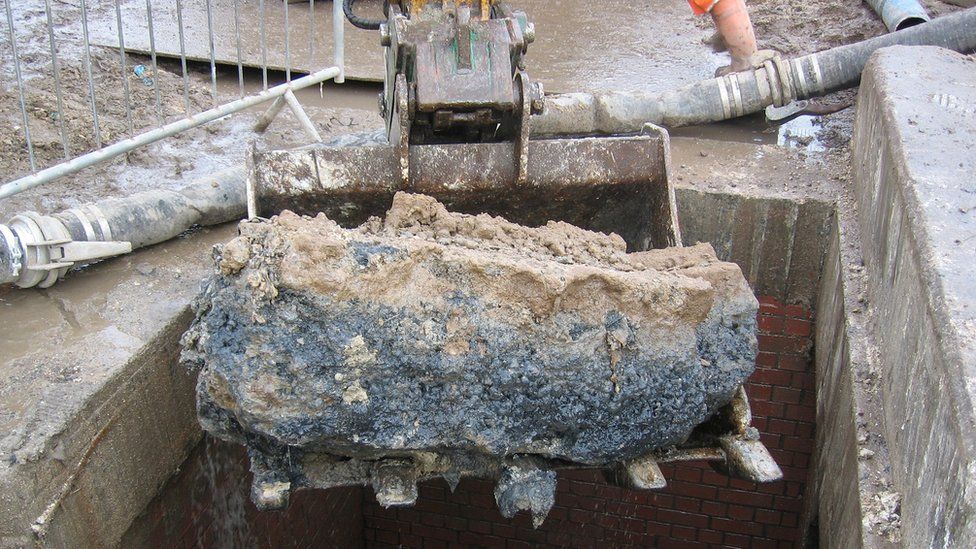Town's drains 'placed on diet' to tackle greasy fatbergs
- Published
- comments

A town's drains are to be starved of grease and oil in a bid to tackle the menace of so-called fatbergs.
A pilot scheme in St Andrews will see experts advising every food business how to dispose of waste correctly.
The new campaign is led by Scottish Water which attends an average of 95 blockages every day in Scotland at a cost of £6.5m a year.
The deposits are caused by fat, oil and grease being flushed unfiltered down sinks and clogging up the sewer system.
The Fat Free Sewer project - the first of its kind in Scotland - will see every food service establishment in the Fife town visited by waste management experts.
'Consequences can be huge'
Mike Will, waste water operations general manager at Scottish Water, said fatbergs were a real headache for the utility.
He said: "The consequences on the environment can be huge - it can cause flooding to properties and roads and pollute rivers, as well as impacting valuable assets such as bathing waters.
"Currently Scottish Water visits food service establishments on a reactive basis, once blockages have occurred.
"In some cases these are one-off events, but sometimes we do get called to the same locations."
He said it was the first time the utility had proactively set out to stem the problem before its arises.
Mr Will said: "We are effectively attempting to put St Andrews' drains on a diet."
St Andrews was picked for the six-month pilot project as it has more than 100 food establishments in close proximity.
If the project succeeds in cutting blockages due to Fog (fat, oil and grease) it is set to be rolled out to other parts of Scotland.
Scottish Water will work with the environmental team at Fife Council on the project.
Why fatbergs matter
- Cafés, restaurants or food takeaways produce an average of more than 5kg (11lb) of food waste per week
- It is an offence under the Sewerage (Scotland) Act 1968 to interfere with the free flow of the sewers
- Fat, oil and grease do this when they congeal
- Under the Waste (Scotland) Regulations 2012, urban food businesses have to present food waste separately for collection
- Scottish Water deals with 37,000 blockages every year - at a cost of £6.5m
- The waste water drain which runs from a property to the public sewer is usually only about four inches wide
- Scottish Water maintains and improves more than 30,000 miles of sewer pipes
- A monster fatberg weighing 130 tonnes was discovered in a sewer in London last year
Councillor Ross Vettraino, Fife Council's environment spokesman, said: "An efficient sewerage system is an unseen but essential component of an environment, which we can enjoy and of which we can all be proud.
"Scottish Water is to be applauded for this initiative and I am confident the council's environmental health resource will be pleased to work with Scottish Water to ensure its success."
A team of officers from monitoring service Environmental Compliance & Services (ECAS) will visit food service establishments on behalf of Scottish Water.
Philip Soden, managing director of ECAS, said: "We are excited to be working with Scottish Water on this project.
"We have extensive experience working with the food service sector to ensure waste Fog is trapped at source and providing the right advice and education to achieve this."